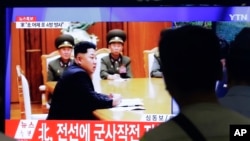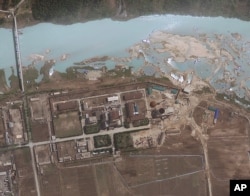North Korea’s recent pronouncements touting advances in its long-range rocket program and restarting its nuclear reactor appear to fit Pyongyang’s established pattern for pressuring the United States and its allies for aid and assistance.
“The first stage is to make the situation look as tense as possible,” said Andrei Lankov, a professor of Korean Studies at Kookmin University in Seoul.
Professor Lankov said that in the 1990s and 2000s Kim Jong Un’s father Kim Jong Il used missile launches, nuclear weapons and conventional military provocations to create international crises.
“Once the situation looks very tense and the world media begins to talk about the Korean peninsula being on the brink of war, North Korea then agrees to negotiate and agrees to drive tensions down in exchange for some concessions,” Lankov said.
Yongbyon reactor
Most recently in 2007 North Korea agreed to shut down its Yongbyon reactor in return for emergency energy assistance and enter into six-party talks involving the U.S., China, Russia, Japan and the two Koreas to normalize relations.
But in 2009, North Korea pulled out of the denuclearization talks and expelled international inspectors after the U.N. Security Council condemned Pyongyang for a failed satellite launch that was considered a test of an intercontinental ballistic missile.
Since then both South Korea and the U.S. have taken a firm stand to require Pyongyang to halt its nuclear program before they would enter into any new talks. The North’s subsequent military skirmishes with the South, ballistic missile launches and third nuclear test have drawn increasing international sanctions.
South Korea’s Unification Ministry spokesman Jeong Joon-hee Wednesday reinforced what U.S. and other western leaders have been saying about Pyongyang’s recent announced developments, that its main nuclear reactor is operational and it is preparing to launch a satellite into space.
“If [North Korea] launches a rocket or conducts a nuclear test, it will be a grave provocation, and a military threat. Also it is an act which squarely violates the resolution of the U.N. Security Council,” Jeong Joon-hee said.
Sanctions and penalties
This time, rather than forcing a compromise, Pyongyang would more likely face further penalties and isolation.
South Korea recently reached a breakthrough with the North after border tensions in August threatened to escalate into a bigger clash. Seoul agreed to turn off loudspeaker broadcasts on the border that were criticizing Kim Jong Un and both sides agreed to pursue reunions of separated families, cultural exchanges and further talks to reduce tensions.
The South Korean government has declined to say whether it would respond to a missile launch or nuclear test by ending engagement activities and restarting the border broadcasts but Korea analyst Ahn Chan-il with the World Institute for North Korea Studies says Seoul should make it clear that there will be consequences.
“I think South Korea must continuously send warnings to North Korea by considering [the threats] as abnormal situation, because there are promises made between two Koreas on family reunions and high-level talks, ” Ahn Chan-il said.
China’s role
International sanctions have had a limited impact on North Korea but China’s continued economic support through direct aid and trade has helped the Kim Jong Un regime stay in power.
Beijing has urged Pyongyang to abide by United Nations resolutions that ban ballistic missile and nuclear weapons development. On Tuesday, China’s foreign ministry spokesperson said Beijing is committed to peace and stability on the Korean peninsula and called for dialogue.
But Bruce Bechtol a North Korea analyst at Angelo State University in Texas said in a recent podcast interview that China has been providing North Korea with equipment needed for their long-range missile program.
“The North Koreans actually got that transporter erector launcher from the Chinese. So it is very disturbing,” Bechtol said.
North Korea maintains that its satellite launches are for peaceful purposes like weather observation. The United States and its allies consider them covers for banned tests of long-range missiles.
South Korean President Park Geun-hye has worked to improve ties with China while President Xi Jinping’s relationship with Kim Jong Un has been strained.
Still, Lankov said, Beijing is wary of Seoul’s close alliance with Washington. He expects the Chinese to impose some punishment or added sanctions on the North if it conducts a missile or nuclear test but not to cripple the regime.
“Beijing is quite capable of essentially, if you like, closing the shop, knocking the North Koreans down, knocking them completely but whether China will do it or not is a good questions, I’m inclined to believe it will not,” Lankov said.
North Korea’s pronouncements have added to speculation that it will launch a long-range rocket in early October on the 70th anniversary of the country’s ruling party.
But analysts with the U.S. Korea Institute’s website 38 North say recent satellite imagery of the Sohae Satellite Launching Station ("Tongchang-ri") show no signs yet of any preparations for an upcoming launch.
VOA Producer Youmi Kim in Seoul contributed to this report.











